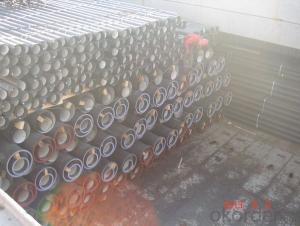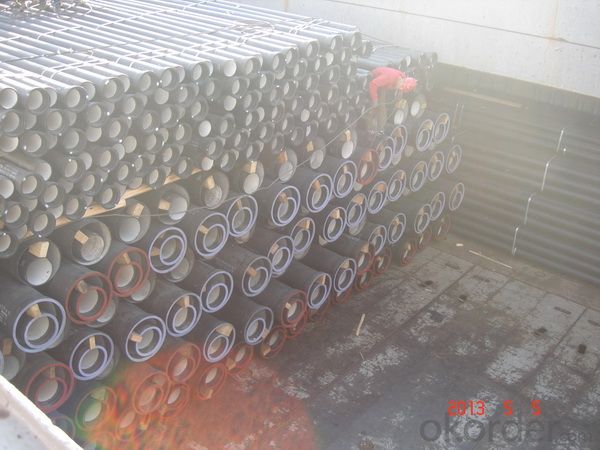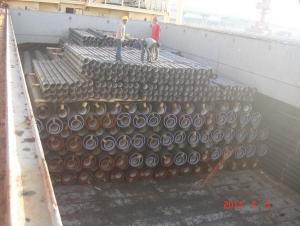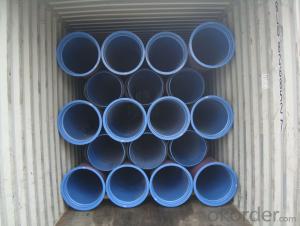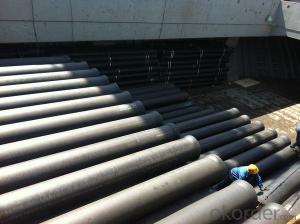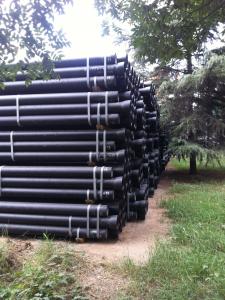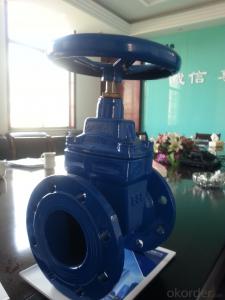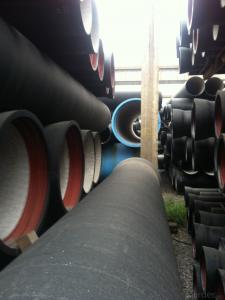DUCTILE IRON PIPES AND PIPE FITTINGS K8CLASS DN100
- Loading Port:
- Tianjin
- Payment Terms:
- TT OR LC
- Min Order Qty:
- 22 pc
- Supply Capability:
- 3000 pc/month
OKorder Service Pledge
OKorder Financial Service
You Might Also Like
Material : Ductile Cast Iron
Size Range : DN 80mm to DN 2000mm
Unit Effective Length : 6m or 5.7m
Manufacture Standard: ISO 2531:1998/ EN 545:2006/EN 598:2007
Annual capacity : 200,000 tons
Coating Exterior: Zinc 130g/m2 according to ISO 8179-1 and bitumen coating 70 microns.
Cement Interior: Portland Cement/ High Alumina Cement/ Sulphate Resisting Cement Lining according to ISO 4179
Special requirements on external coating and internal lining can be applied
We also provide accessories such as SBR/EPDM rubber gaskets, lubricant paste, pipe caps, PE sleeves, etc.
Additional Parts:
Each pipe is strictly inspected according to related standard to ensure permanently high performance.
Easy Installation at site and service free for life
Long Service Lifespan
Quotation will arrive you within 24hours once we get your inquiry.
We guarantee offering you a competitive price.
A copy of original inspection reports of pipes will be offered after shipment.
Photos of loading process will be sent to the customer after shipment effect.
We will follow-up the delivery progress after shipment effect and update to the customer on weekly basis.
- Q: Do ductile iron pipes require internal lining for potable water applications?
- Yes, ductile iron pipes do require internal lining for potable water applications. This is because the iron used in these pipes can react with the water and potentially contaminate it. Internal lining acts as a barrier between the water and the iron, preventing any chemical reactions and ensuring the water remains safe for consumption.
- Q: Ductile iron pipe joint damage, water leakage, want to see the connection with other pipe fittings, how to operate?!
- Sawing grinding head, increasing steel socket set
- Q: Can ductile iron pipes be used in areas with high groundwater levels?
- Indeed, areas with high groundwater levels can accommodate the use of ductile iron pipes. Renowned for their robustness, endurance, and anti-corrosion properties, these pipes prove themselves suitable for diverse purposes, such as water supply systems. Their structural integrity remains intact even when confronted with elevated groundwater levels. Additionally, the smooth interior surface of ductile iron pipes aids in sustaining optimal flow capacity while minimizing the likelihood of blockages or sediment accumulation. Thus, they offer a dependable option for regions with considerable groundwater levels, ensuring a durable and effective resolution for water distribution systems.
- Q: What are the typical joint restraint requirements for ductile iron pipes in seismic zones?
- In seismic zones, the typical joint restraint requirements for ductile iron pipes are designed to ensure the structural integrity and prevent displacement or separation of the pipes during seismic events. These requirements are crucial to maintain the reliability and functionality of the pipeline system. One common joint restraint requirement for ductile iron pipes in seismic zones is the use of flexible or mechanical joint systems. Flexible joints, such as rubber gasket joints, can absorb and accommodate the movement caused by seismic activity. These joints allow for axial movement, angular deflection, and expansion/contraction of the pipes, reducing the risk of pipe failure or damage. Another important requirement is the use of adequate anchoring systems. This involves securing the pipes to the surrounding structures or embedding them in concrete thrust blocks to prevent excessive movement or displacement during seismic events. Anchoring systems help distribute the forces generated by the earthquake and minimize the risk of pipe separation or breaking. Additionally, seismic design standards often require the use of seismic restraints, such as seismic joint restraints or bracing systems, to further enhance the stability and integrity of the ductile iron pipes. These restraints are designed to limit the movement of the pipes in specific directions, reducing the potential for damage and maintaining the overall system performance. It is important to note that the specific joint restraint requirements for ductile iron pipes in seismic zones may vary depending on local building codes, seismic activity levels, and engineering considerations. It is crucial to consult the relevant regulations and work with experienced professionals in the design and installation process to ensure compliance with the necessary requirements for seismic resistance.
- Q: Can ductile iron pipes be used for gas distribution systems?
- Certainly, gas distribution systems can utilize ductile iron pipes. The utilization of ductile iron pipes in various infrastructure applications, such as gas distribution systems, is widespread due to their exceptional qualities, including strength, durability, and resistance to corrosion. These pipes are engineered to withstand the high-pressure flow of gas and are suitable for installations both above and below ground. Furthermore, ductile iron pipes exhibit remarkable resistance to external loads, minimizing the risk of damage or fracture, thereby establishing them as a dependable and secure choice for gas distribution systems. Nevertheless, it is crucial to ensure that the pipes receive proper coating and protection against any potential corrosive elements present in the gas or soil to guarantee their longevity and optimal performance.
- Q: How does ductile iron pipe perform in areas with high seismic activity?
- Ductile iron pipe possesses exceptional strength and durability, making it an ideal choice for areas with high seismic activity. Seismic events, such as earthquakes, can exert significant stress and strain on pipelines, leading to rupture or failure. However, ductile iron pipe's unique material properties enable it to withstand these dynamic forces. One of the main advantages of ductile iron pipe in seismic regions is its remarkable flexibility. Unlike rigid materials like cast iron or steel, ductile iron exhibits a higher degree of elasticity. This allows it to deform and absorb energy during seismic events, dissipating the seismic forces and reducing the risk of pipe failure. Consequently, damage to the overall pipeline system is minimized. Furthermore, ductile iron pipe is manufactured with a high level of ductility, meaning it can undergo substantial deformation without fracturing. This characteristic is particularly crucial in seismic zones as it enables the pipe to endure ground movements and seismic waves without compromising its structural integrity. Additionally, the ability of ductile iron to absorb and redistribute stress helps prevent localized failures, ensuring the pipeline system's overall stability and reliability. Additionally, ductile iron pipe possesses excellent corrosion resistance, which is especially vital in high seismic areas where ground movement and subsequent water leaks can compromise the pipe's integrity. The corrosion resistance of ductile iron ensures the longevity and reliability of the pipeline system, minimizing the risk of leaks or failures during seismic events. In conclusion, ductile iron pipe performs exceptionally well in areas with high seismic activity due to its superior flexibility, high ductility, and corrosion resistance. These properties allow the pipe to withstand the dynamic forces generated during seismic events, providing a reliable and long-lasting solution for fluid transportation and ensuring the safety of communities in earthquake-prone regions.
- Q: Can ductile iron pipes be used for underground river crossings?
- Underground river crossings can indeed utilize ductile iron pipes. Renowned for their robustness and longevity, ductile iron pipes are highly versatile, making them ideal for a range of applications, including underground river crossings. These pipes possess exceptional tensile strength, enabling them to withstand the external forces and pressures imposed by the surrounding soil and water. Moreover, their outstanding resistance to corrosion is paramount when dealing with subterranean water sources like rivers. Additionally, ductile iron pipes can endure ground movements, settling, and any geological obstacles that may arise during the installation and operation of underground river crossings. Consequently, they represent a dependable choice, ensuring the secure and efficient conveyance of water across rivers while preserving the integrity of the subterranean infrastructure.
- Q: How can the ductile iron pipe be welded?
- Welding cast iron is mainly in three aspects: carbon control, stress elimination, structural adjustment. You can choose better welding materials, such as WE777 and other imported welding materials. Crack resistance is very good. In addition, the sewing process can be adopted in the structure to increase the stability of the welding effect. You can learn more about WE777 welding applications.
- Q: Are ductile iron pipes suitable for use in seismic areas?
- Ductile iron pipes are indeed appropriate for usage in seismic regions. The strength and durability of ductile iron enable it to endure seismic forces and ground motions linked to earthquakes. Its exceptional flexibility and high tensile strength provide resistance against cracking or fracturing in highly challenging circumstances. Furthermore, ductile iron pipes have exhibited their trustworthiness and appropriateness in seismic zones over an extensive period. Nevertheless, to optimize their efficiency and mitigate any probable risks, it is crucial to adhere to appropriate installation methods and seismic design principles.
- Q: Can ductile iron pipes be used for irrigation pivot systems?
- Yes, ductile iron pipes can be used for irrigation pivot systems. Ductile iron pipes have high tensile strength and durability, making them suitable for handling the pressure and load requirements of irrigation pivot systems. Additionally, their corrosion resistance makes them a reliable choice for long-term use in such applications.
Send your message to us
DUCTILE IRON PIPES AND PIPE FITTINGS K8CLASS DN100
- Loading Port:
- Tianjin
- Payment Terms:
- TT OR LC
- Min Order Qty:
- 22 pc
- Supply Capability:
- 3000 pc/month
OKorder Service Pledge
OKorder Financial Service
Similar products
Hot products
Hot Searches
Related keywords
